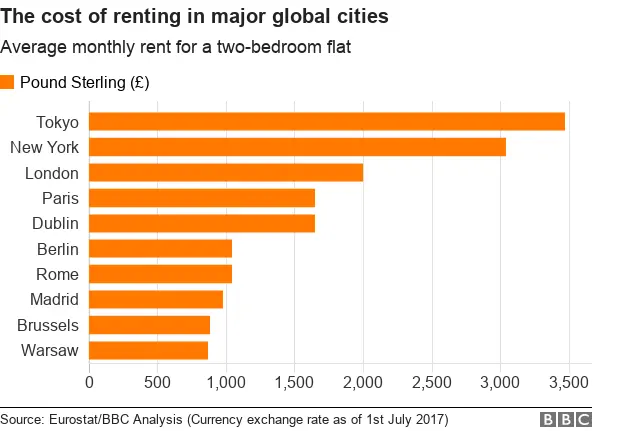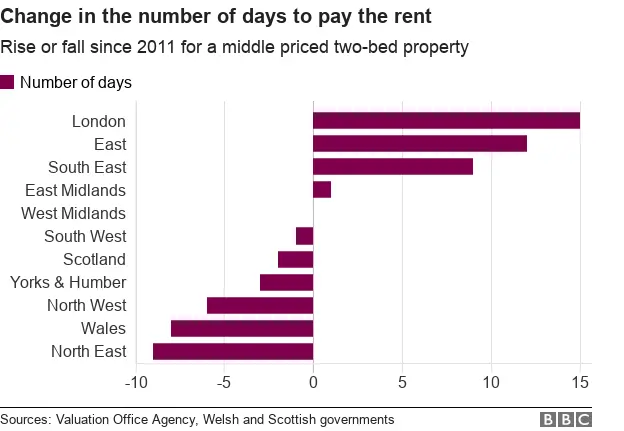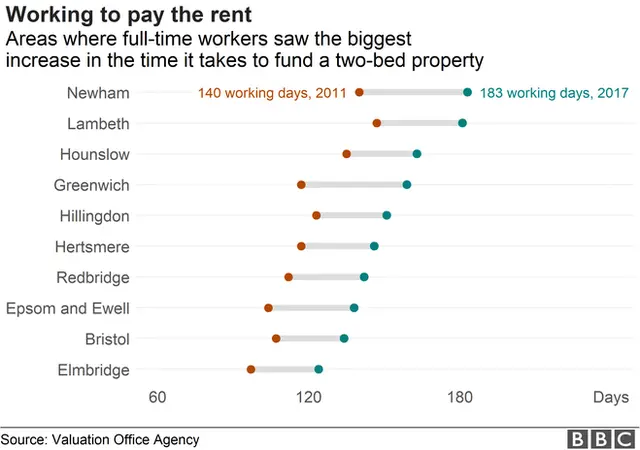Rent costs full-time workers every penny earned until May
 Getty Images
Getty ImagesA year's rent takes up every penny earned by full-time workers until the first week of May, analysis by BBC News reveals.
A middle income earner in England would work 86 days to rent an average two-bedroom home, five more than in 2011.
In Scotland and Wales the number of working days needed to cover their rent fell to 79 and 71 days respectively.
The Residential Landlords Association said property owners were not making "a fortune" out of tenants.
We have created a clickable map showing the change in the number of working days it takes to cover the rent in each local authority area in Great Britain. Scroll down the story to try it.
Rising property prices have made it harder for millions of people to buy a home and the number of households renting privately has reached a 30-year high, according to the English Housing Survey.
Where is it hitting hardest?
 Rebeca Corona and Fernando Garcia
Rebeca Corona and Fernando GarciaWhile London has seen the gap between rents and wages widen most, other parts of southern England also cost more to live in than some European capitals.
New high-tech and engineering jobs have drawn skilled workers to places like Cambridge.
Rising demand and limited supply have pushed rents up.
Rebeca Corona, 30, and partner Fernando Garcia, 31, have been renting in the city for about two months, having moved from Madrid.
"We knew before we got here that prices in England were high," said Mr Garcia.
"But we hadn't anticipated how quickly properties were let out and how small they are in comparison to Madrid."
Map by Daniel Wainwright and Clara Guibourg, built by Carto.
If you can't see the map tap or click here.
Ms Corona added: "I love living in Cambridge, because I can be at work in less than half an hour.
"But we currently pay £1,250 a month for a two-bed property in Cambridge and for the same price in Madrid we could get a property that would be twice as big."
Figures compiled by Eurostat show that in 2017 Madrid was one of the cheapest major global cities to rent in, with average rents for two-bed properties half those in London.

Analysing the median annual rent for two-bedroom properties and the median income of full-time workers in Great Britain the BBC England Data Unit found:
- If the typical full-time worker in England, living alone, spent everything they earned after tax and national insurance on their rent, they would have made enough money by 3 May.
- Similar workers in Scotland would have earned enough money to pay their rent by 24 April and in Wales workers would be rent free by 12 April.
- Nearly half of local authority areas in Great Britain have seen annual rents for two-bed properties increase faster than the average take home pay.
- In London the cost of rent eats up 15 more days' pay than it did in 2011.
The increase in the time it takes to pay the rent is not repeated across Britain. Tenants in much of the north of England, Scotland and Wales have seen the number of working days fall.
In these areas take home pay has broadly increased faster than rental prices, owing to rises in the amount people can earn before paying tax, known as the personal allowance.

This allowance increased from £7,475 in 2010-11 to £11,000 in 2016-17 and is now £11,850.
The workers squeezed the most by rents rising faster than pay are in the south of England.
A private tenant in London would have to work 165 days to earn enough to cover the rent on a two-bed property, compared to 66 days for a worker in the North East.

In the capital, even renting a room in a shared property takes a full-time worker until 27 March.
A middle-earning worker makes £27,150 in the capital after tax and National Insurance. Renting a room at an average of £7,200 they would have to work 67 days just to cover the rent.
That is nearly three weeks longer than in 2011.
'I don't think I'll ever be able to go home'
In Bristol, rents have increased so much that it takes another month to be able to afford a two-bed property, compared with 2011.
The growth of financial services and technology companies in Bristol has seen the median rent increase by 43%.
 Rich Franklin
Rich FranklinRich Franklin left the city to move 250 miles north to Halifax so he could afford a place to rent alone while saving to buy.
Mr Franklin, 45, earns around the median national wage working in financial services.
"I've shared houses with people, but I now want my own space and if I ever want to retire I need my own home," he said.
"The only way I can save up the money to buy a house is by renting in Yorkshire."
- 'It's very precarious' - Life as a renter
- Are you renting? BBC News has set up a new UK Facebook group all about affordable living. Join the Affordable Living group here.
The typical rent for a two-bed property in Bristol is about £11,940, but in Halifax in Calderdale, the rent for a similar size property is £5,700 a year.
"I can see why the rental market leaves people angry," Mr Franklin said.
"I've left friends behind in Bristol that I've known for 20 or 30 years and to be honest I don't think I'll ever be able to go home. This is the human cost of a housing market that doesn't work for everyone and which has left me having to start my life all over again".
Local pressures
David Smith, policy director for the Residential Landlords Association said the figures reflected how rental markets vary across the country, despite assumptions the rental market in London reflects the picture across the rest of Britain.
"There are local pressures across the country each with different underlying cause," he said. "What we need is a housing policy that is more flexible and we need to remember the vast majority of landlords don't rent out properties to make a fortune off the backs of young people."
Adam Hyslop, of letting agent OpenRent, said there were no quick fixes.
He said: "Long-term issues with renting are rooted in the issue of supply and I believe if we can build more new homes and increase the number of properties available this will help bring rental prices down."
The government has said its reforms to building legislation have seen the highest number of first time buyers in more than a decade, while it also plans in England to introduce legislation that would ban letting agents from charging fees. The law already exists in Scotland.
About the data
The BBC England Data Unit analysed data for the median rent of two-bed properties in England, Wales and Scotland, gathered by the Valuation Office Agency in England and the governments in Scotland and Wales. There are no comparable figures for Northern Ireland. The total sample size was more than 200,000 private rental agreements.
Median wage data for each local authority area in Great Britain is drawn from the Office for National Statistics.
The number of days it would take a tenant to pay the annual rent on a private two-bed property is calculated by dividing the median annual rent for a property by the median daily net pay for a full-time worker in each local authority area.
Net pay is calculated by taking the gross annual pay for the median worker in each local authority area, accounting for the personal allowance, income tax and national insurance, then dividing the figure by the total number of days the median worker could spend at work. The calculation excludes weekends, eight bank holidays in England and Wales and nine bank holidays in Scotland.